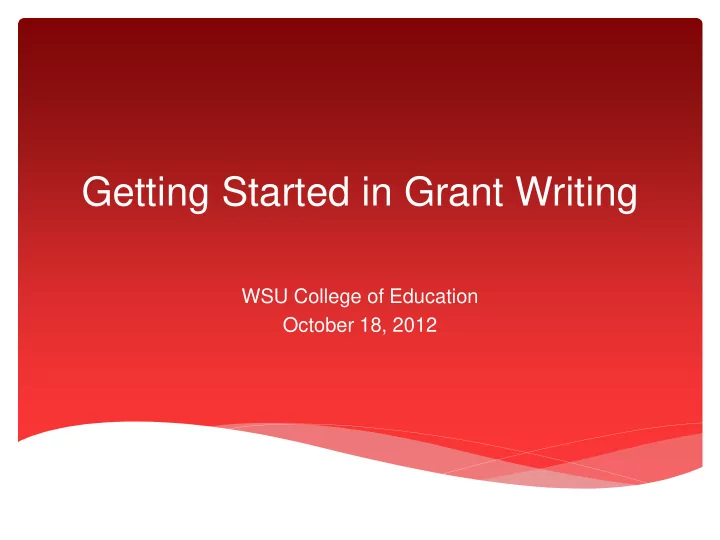

Getting Started in Grant Writing WSU College of Education October 18, 2012
Introductions ∗ Welcome! ∗ Brief introduction from all attendees and campuses. ∗ Research interests? (You might find a new collaborator for a grant project)! ∗ Specific challenges in grant writing?
Grant Writing vs. Academic Writing ∗ The academic writing style you’re used to (for journal articles, etc.) does not win grants. ∗ It can actually hurt your chances. ∗ If a reviewer says a proposal “reads like a journal article,” this is not a good thing! ∗ To succeed at grant writing, you need a new set of writing skills.
Comparison of Writing Styles Academic Writing Grant Writing ∗ Easy to understand ∗ Academic language, jargon ∗ Brief, concise ∗ Lengthy, verbose ∗ Personal, enthusiastic ∗ Objective ∗ “Sell” to the reader ∗ Explain to the reader ∗ Goals, activities, outcomes ∗ Thesis statement, theory ∗ Action-oriented ∗ Focused on ideas ∗ Agency goals, service ∗ Your own goals ∗ Team-focused ∗ Individualistic
How does grant writing style look in practice? ∗ Short, clear sentences ∗ Key phrases underlined or bolded ∗ Lists (bulleted or numbered) ∗ Graphs and tables ∗ Active voice (I or we), future-focused ∗ Strong, persuasive phrasing ∗ Conveys enthusiasm ∗ Includes goals, activities, outcomes, evaluation plan
Where do I find examples of successful proposals? ∗ Many funders post abstracts online ∗ COE posts some proposals on Sharepoint ∗ Colleagues may or may not want to share ∗ Reviewer feedback is also quite valuable (silver lining to rejection)
Adjust Your Perspective ∗ Don’t explain why you need funding…Show how you can help the agency further its goals. ∗ You and funder are a team, working on common goals. ∗ Take reviewer’s POV, reading 100’s of proposals. ∗ Make yours stand out: innovative, brief, clear, exciting. ∗ Put essential info on 1 st pg (goals, activities, outcomes) ∗ Write for generalists, not specialists ∗ It’s like advertising, but don’t sell yourself or your idea ∗ Sell your action plan and expected results
Grant Writing Process ∗ Read RFP and guidelines, adjust plan to fit ∗ Consider alternate sources and grant types ∗ Before starting, discuss with collaborators ∗ Then contact grant officers to ensure fit ∗ Get internal deadline from WSU grant staff ∗ Rewrite many times, seek feedback from colleagues and editors
Foundations ∗ Often led by wealthy benefactors or those who carry out their wishes ∗ Cultivate relationship first ∗ WSU Foundation can help establish contact and share success history ∗ Often short letter of intent (LOI) ∗ Once LOI is accepted, you write full proposal ∗ Once proposal is accepted, you may need to jump through another hoop & present at board mtg
Federal Sources ∗ Big money, large projects, long proposals ∗ Acceptance rate once 1:10, now often 1:60 ∗ Transformative, generalizable, model projects ∗ Partnerships, collaboration valued ∗ Detailed RFPs and strict guidelines ∗ Often a short LOI first ∗ Plan to submit several, use reviews to improve ∗ Keep on truckin’! (Workshop 2, Staying the Course)
State Sources ∗ Still big money, but can be easier to procure ∗ Advantage of regional contacts, partnerships ∗ Agency may have funded other WSU projects ∗ You may be competing with your colleagues ∗ Or you may be collaborating with them! ∗ Partnerships are valued (agencies, schools, etc.)
Local Sources ∗ Easier to win ∗ Easier to write (short application) ∗ “Small potatoes” in terms of funding ∗ Good for small pilot projects, equipment ∗ Can be a single investigators ∗ Often offered by local businesses ∗ Larger corporate funders with business in our area have more money, use your project to advertise
WSU Grants ∗ Challenge Grants ($100K this year, COE won) ∗ Faculty Research Awards ∗ Fellowships ∗ Travel Grants ∗ Clear guidelines, short proposals ∗ Good for individuals (except Challenge grants) ∗ Provide experience & notoriety for future grants
Assistance with Writing Process Laura Girardeau, lgirardeau@wsu.edu, x6232 Faculty Research Development Coordinator I help COE faculty identify funding sources, focus projects and edit drafts WSU Foundation: helps with contacts, background, success history, etc. COS Pivot, grants database hosted by WSU. (Platform may change: use Pivot while you can).
Questions? Shared Strategies? *Questions? Tips on what’s worked for you? *I’ll email you copies of this presentation and useful articles *I have several grant writing manuals in my office (Cleveland 262) to lend for 1 week References: Why Academics Have a Hard Time Writing Good Grant Proposals (2007). Society of Research Administrators, Inc. Grant Writing in Higher Education, by Kenneth T. Hanson (2004). Pearson Education. THANK YOU FOR COMING! Workshop #2, Nov. 15, 12-1 pm: Staying the Course (how to stay motivated)
Recommend
More recommend